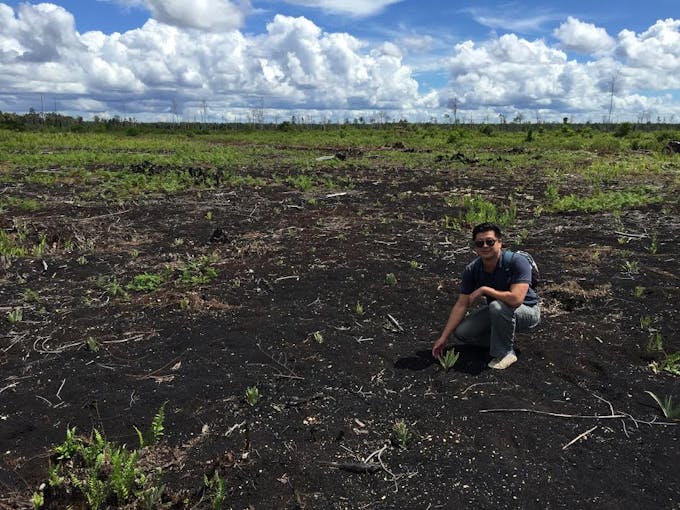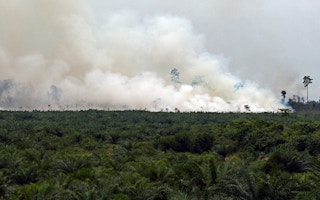Blockchain technology will be used for the first time this December in an attempt to protect Indonesia’s rainforests and prevent the peatland haze fires that blight the region on a regular basis.
To continue reading, subscribe to Eco‑Business.
There's something for everyone. We offer a range of subscription plans.
- Access our stories and receive our Insights Weekly newsletter with the free EB Member plan.
- Unlock unlimited access to our content and archive with EB Circle.
- Publish your content with EB Premium.
Spearheaded by industry group Carbon Conservation, the Smart Contract for Good programme will automatically distribute funding to villages in Aceh when they successfully reduce incidences of fire, in a pilot project beginning next month.
This is done through what is known as a smart contract, a computer protocol or set of rules used to verify or enforce the terms of a contract on the blockchain.
Rewards will be drawn down from a warchest, or “bounty”, of US$100,000 that has been pledged to the project by Indonesian corporate sponsors, and will go towards building infrastructure such as schools and hospitals to benefit the community.
Organisers are still working out the details of the payouts but say they are likely to be capped at $10,000 per village with the size of the reward depending on the results achieved.
The release of funds is expected to take place on an annual basis, in parallel with Indonesia’s annual dry season between May and September when fires are the most prevalent. Sun added that mechanisms for running the scheme will eventually be put in place to ensure the proper distribution of funds.
Carbon Conservation will unveil the project on Monday at COP 23, the United Nations Framework Convention on Climate Change meeting in Bonn, Germany.
Australia-based Dorjee Sun, chief executive officer of Carbon Conservation, told Eco-Business via email: “We want to give communities tangible rewards to support their efforts when they protect their forests.”
“The irreversible damage inflicted on environments will only further impoverish those communities as the natural resources they rely on literally go up in smoke,” said Sun, whose organisation Carbon Conservation had been the inaugural secretariat of the Fire Free Alliance, which works with communities in Indonesia on separate projects to cultivate land without burning.
Companies in the FFA have clarified that they are not the corporate sponsors crowdfunding the Smart Contract for Good project.
Because of the blockchain technology underpinning the smart contract, the release of funds is automatic and the data logged is permanently documented in a shared, transparent and unchangeable record.
The Smart Contract for Good will determine the release of funding using data from remote sensory or satellite imaging technology that can monitor forest fires or ground site inspections.
Smart contracting platform Dappbase is the key technology partner in the project. Chief executive Zhang Taiyang said smart contracting technology can circumvent potential issues of red tape and corruption that would stall the distribution of aid money to communities on the frontline of forest protection.
The decentralised nature of blockchain technologies allows potential partners or donors to inspect the exchanges made through the smart contract and verify it for themselves, he added.
“
The forest is best protected by those who live in the forest, not by those who have big pens and big mouths.
Yusuf Irwandi, Governor of Aceh
This is not Sun’s first venture when it comes to protecting Aceh’s forests. In 2007, he partnered then-governor Yusuf Irwandi to run a carbon credit programme to help local people and conserve forests, though “the subsequent collapse of the carbon credit market made this unfeasible”, according to Sun.
The production of commodities such as paper and palm oil is an important source of income and employment in Indonesia. But the unfettered pace of forest clearing to make way for farmland combined with poor farming practices has resulted in environmental degradation, the exacerbation of climate change and a thick, acrid smog that drifts as far as Malaysia and Singapore when farmers clear their land by burning. Hundreds in Aceh alone have suffered from respiratory illness as a result of the haze.
The reconstruction of Aceh after the Boxing Day tsunami of 2004 has sped up the deforestation of a habitat that is home to orangutans, elephants and tigers.

Carbon Conservation chief executive officer, Dorjee Sun, at a proposed conservation site in Aceh. Image: Carbon Conservation
Yusuf, who was re-elected as governor of Aceh earlier this year, said: “After announcing a forest-clearing moratorium 10 years ago, we in Aceh still protect the forest with no financial help from the international community.
“Maybe finally with satellite proof and smart contracts the villagers who conserve the forest of Aceh can be rewarded. The forest is best protected by those who live in the forest, not by those who have big pens and big mouths.”
Dappbase and Carbon Conservation have said they will launch crowdfunding portals on their respective websites to allow individual and corporate donors to contribute. They also plan to scale up Smart Contract for Good for use around the country and potentially overseas.
Zhang said: “Aceh will be the first Smart Contract for Good project deployed, but we hope that other social or environmental activists will use the Dappbase platform and underlying technology to develop and deploy other similar projects globally for the causes they care about.”








